- Home
- Alex Berenson
The Silent Man Page 2
The Silent Man Read online
Page 2
Akilev would rather have stopped for the night, but he had no choice. There were no bases between here and Mayak. Anyway, the convoy was due by midnight. Never mind that the plant would effectively be closed by then. The convoy was due, and as long as it arrived by 11:59 p.m., Akilev would get credit for a job well done. If he crossed the gate at Mayak at 12:01 a.m., on the other hand . . . Akilev shook his head. No one had ever accused the Russian army of having sensible rules.
GRIGORY FARZADOV SAT in his decrepit kitchen, sipping peach brandy from a chipped glass, watching the LCD timer on his microwave count down toward zero. He wore no pants or shirt, only gray underwear that billowed around his giant haunches. The temperature outside had fallen close to zero, but a film of sweat covered his belly and legs.
Grigory was a hulking shambles of a man, a cross between Frankenstein and Mr. Potato Head, with big soft hands and pitted skin. He’d never been married or had a girlfriend. He’d never even had sex without having to pay for it. He had been cursed with a fine mind and a fiercely ugly body. He wished every day for the reverse, but the choice wasn’t his to make. Fate made fools of men. He’d been born alone, and he’d surely die alone.
Beep. Beep.
Dinner was ready. Grigory lumbered up and extracted a pepperoni pizza from the microwave. He cut the slices into small bites, savoring each forkful. His movements were oddly dainty, in sharp contrast to his size—and his surroundings. Leaky pipes had discolored the kitchen’s walls and loosened the plaster from the ceiling. The rest of the apartment wasn’t much better. The electricity cut out sporadically, always when Grigory had just settled in to watch television. At least the heat worked, but too well. From November through April, he kept the windows open, and still he sweated.
Worst of all was his next-door neighbor Mikhail, a worthless drunk who divided his time between watching pornography and battering his wife. One particularly ugly night a year earlier, Grigory had knocked on Mikhail’s door and threatened to call the police. A half-hour later, he heard Mikhail outside his door, shouting, “Out, you fat coward!” The ranting continued until Grigory made the mistake of opening up. When he did, Mikhail pulled him into the hallway and jammed a pistol under his chin.
“If you ever interfere with me again, you elephant—” Mikhail shoved Grigory down and launched a glob of spit at his face. As Grigory curled on the concrete floor, Mikhail kicked him, his steel-tipped boots leaving bruises that didn’t fade for weeks.
But Mikhail wasn’t a problem anymore, Grigory thought. No. His new friends had taken care of Mikhail. Grigory shivered, suddenly cold despite the overheated apartment, and poured himself another glass of peach brandy. Very soon he would need to make his decision. Though it was really no decision at all. He tossed the brandy down the sink. He would need to be sober tonight.
FOR THIS LIFE Grigory had trained in operations research for six years at Ural State University in Ekaterinburg. He hadn’t been at the top of his class. Those men went to energy companies like Gazprom. The middling students, like Grigory, weren’t so lucky. They became engineers for Rosatom, the ministry that controlled Russia’s nuclear weapons plants and storage depots. Grigory worked at the weapons depot at Mayak as a manager in the PC&A unit, responsible for the protection, control, and accounting of nuclear material. He lived in Ozersk, the “closed city”—protected by checkpoints and a barbed-wire fence—that surrounded Mayak.
Grigory didn’t have many friends. But for most of his life he’d been close to his cousin Tajid. Like Grigory, Tajid lived in Ozersk and worked at Mayak, as a security guard. On the long cold nights when the very walls of his apartment mocked his loneliness, Grigory often found his way to Tajid’s. He always took a bottle of Stolichnaya and a fresh orange for Tajid’s wife by way of apology for the intrusion. He and Tajid sat in Tajid’s kitchen and drank until Grigory staggered home.
But over the last three years, Grigory had become less welcome at his cousin’s apartment. Tajid had fallen in with a bunch of Kazakhs. They claimed to be taxi drivers, but they hardly worked, from what Grigory could see. They spent their time drinking coffee and reading the Quran. Tajid and Grigory had both been born Muslim, but they’d never practiced the religion growing up. In their youth, the Communists had frowned on organized religion. Today, the Russian government still discouraged Islam, though it wasn’t illegal. Employees at Mayak were warned against becoming overly involved with “foreign religious groups,” which everyone knew was code for Islamic fundamentalists.
“What do you want with those peasants?” Grigory asked his cousin one winter night. “They aren’t even Russian.”
“They follow the true path, cousin. Come, see for yourself.”
“Look at me. You think I have any reason to believe in God?” Grigory laughed. “A drink, cousin?”
“I told you I don’t drink anymore.”
“Suit yourself.” Grigory threw back a shot of vodka.
The next time Grigory showed up at Tajid’s apartment, Tajid wasn’t alone. One of the Muslims was there, too. Tajid looked at the bottle of vodka Grigory held. “Give me that,” he said, his voice low and angry.
Grigory handed the bottle over and watched in horror as Tajid tossed it out his window.
“Never bring alcohol to my home again.”
“Cousin—”
“Go. Now. You bring me disrepute.”
Grigory hadn’t known what to say. Tajid was his oldest friend. His only friend, really, aside from the old men at the city chess club, who were as lonely as he.
He’d left Tajid alone for a few months. Then, finally, he’d worked up the courage to return to his cousin’s apartment—this time carrying no vodka, only a bag of dates. When he knocked on the door Tajid hugged him, surprising him.
“I was just thinking of you, cousin.”
Over a cup of strong sweet coffee, he’d told Grigory why.
At first, Grigory had believed, wanted to believe, that Tajid was joking. But after Tajid insisted he was serious a second time, and a third, Grigory had stopped arguing.
“It’s impossible,” he’d said to deflect his nervousness. “Can’t be done.”
“Of course it can,” Tajid said. “You’ve said so yourself many times.”
Indeed, Grigory and his cousin had often talked about the problems at Mayak. Rosatom had dramatically improved the defenses of its nuclear plants since the 1990s, when guards didn’t show up and warheads were stored in warehouses protected only by cheap padlocks. But weaknesses remained, especially in the hours after new warheads arrived. Having finished the dangerous work of moving warheads, convoy commanders were eager to sign over their shipments and leave. Sometimes too eager.
“I don’t want to be involved in this.”
“But my friends already know about you. Your job at the plant.”
“Tajid.” Grigory felt a sinking sensation in his belly, a hopeless feeling that would become uncomfortably familiar. “What do they know?”
“Only your name and your job.”
“My name?”
“My cousin, you can do this.”
“Even if I could find a way—” Grigory broke off, hardly able to believe he was even pretending to consider the suggestion. “How do you know the men proposing this aren’t agents of the FSB”—the Russian Federal Security Service, the successor to the KGB—“or the GUMO?”
“My sheikh vouches for them.”
“That might be enough for you, Tajid, but I need more.”
“Your neighbor Mikhail, does he still bother you?”
“Today and every day. Worthless scum. Why do you ask?”
“We’ll talk soon, cousin.”
A WEEK LATER, Grigory came home to find his apartment unusually quiet. He soon realized why. No porn actresses were screeching in fake pleasure next door.
Mikhail’s body was found the next day, dumped on a back road outside Chelyabinsk. He’d been shot between the eyes. Worse, he’d been stabbed over and over, his ears and tongue cut
off, or so the rumors went. Grigory heard the news and poured himself a glass of vodka, waiting for the phone to ring. He didn’t have to wait long.
“You heard what happened to your neighbor?”
Grigory was silent.
“When can we meet?” Tajid said.
“Whenever you like.”
“An hour, then. At the Moscow”—a rundown café on the edge of Ozersk.
Tajid hung up and Grigory threw back his vodka. The drink warmed his belly but his mind was still cold. Tajid’s men had proved in the most emphatic way possible that they weren’t police agents. They’d also sent Grigory a lesson in what might happen to him if he didn’t cooperate. Two doves with one arrow.
TAJID SAT IN A CORNER of the Moscow with another man, a light-skinned Arab, small, clean-shaven, and neatly dressed, his only distinctive feature his almond-shaped brown eyes. He wore a black leather jacket and a thin gold bracelet. In all, he looked more like a junior member of the mafiya than the jihadi Grigory had expected. But then this man would want to blend in, Grigory thought.
“Your cousin speaks highly of you,” the Arab said in Russian, extending his hand. “I am Yusuf.”
Grigory couldn’t pretend he was a brave man. Nonetheless he screwed up his courage. “Yusuf. This thing you propose to take . . . what will you do with it?” Even now, Grigory could not make himself say bomb.
Tajid frowned. “Cousin, you’ve only just arrived and already—”
“Let him ask,” Yusuf said. He looked at Grigory. “Truly I don’t know. But I promise you this. We won’t use them inside Russia. Part of my job is to get them out.”
“Them?”
“We need two.”
“Madness.”
“Madness or no, we need two.”
“Let me ask you something else, then.” Grigory spoke with bravado he did not feel. “Since we are friends now, speaking frankly as friends do.”
“Go on.”
“You understand these devices have locks? What the Americans call permissive action links? They cannot be used without the proper codes, and the codes cannot be broken. Not even by the most skilled cryptographer. So you must know that whether you steal one of these, or two, or a hundred, they’re useless to you. Unless you have some way of breaking into the Kremlin for the codes.”
“Grigory, you’re very smart. I’m merely a technician. I have a shopping list. And I would like your help in filling it.”
“I don’t think it’s possible, Yusuf. I would tell you, I swear.”
Yusuf patted Grigory’s shoulders. Despite himself, Grigory flinched. “Consider all the alternatives. There’s always a way. Meanwhile—”
Yusuf reached into his jacket and slid a thick white envelope across the table. Grigory peered inside. A wad of green hundred-dollar bills, the new kind, counterfeit-proof, secured with a red rubber band. Grigory tried to hand the envelope back to Yusuf but the little Arab raised a hand.
“Yours,” he said. “Whatever you decide. If you help us I promise ten times more.”
“Very generous of you,” Grigory said. “Now I can buy all the vodka I like.” His tone was ironic, but Yusuf didn’t seem to notice.
Yusuf stood, touched Grigory’s arm. His fingers were as weightless as the devil’s. “We’ll meet again soon. I hope you can work with us.”
SURE ENOUGH, A WEEK LATER, Grigory heard the knocking on his door, a light rapping, so soft that at first he hoped he was dreaming. But the knocking continued, and Grigory opened the door, knowing what he’d see.
“Cousin,” Tajid said. Yusuf stood beside him, holding a leather satchel.
They came in and sat around the plastic table in the kitchen. “Would you like coffee?” Grigory said. He poured himself a glass of vodka. Let them watch him drink.
“Your cousin says you’re an excellent chess player,” Yusuf said.
“Mediocre at best.”
“I’m sure you’re lying. We must play.”
“Whenever you like.”
“So have you given any thought to my proposal?” Yusuf opened his satchel and extracted two oranges and a long curved knife with an ebony handle in a leather sheath. He slid the sheath off, revealing the sharpest blade Grigory had ever seen. Under the fluorescent kitchen lights the blade gleamed silver.
The devil, Grigory thought. Truly, he’s the devil.
“Tajid tells me you like oranges,” Yusuf said.
“Doesn’t everyone?”
“Not me,” Yusuf said. “They’re too fleshy. Something almost human about them.” He worked the blade through the first orange, slicing it in half, then quarters, his movements fine and careful.
Then a frenzy seemed to come over him and he cut faster and faster, turning the fruit into a pulpy mess, not recognizable as an orange at all, its juice dribbling off the table onto the crackled linoleum floor. “I get excited,” he said. “It was the same with your neighbor.” He stood and moved behind Grigory, the knife poised in his hand.
“Please,” Grigory said.
“May I use your sink?”
“I’ll help. I promise.”
“I can do it myself.” Yusuf washed the blade gently, humming to himself.
“I mean with your project. I’ll help.”
Yusuf dried the knife, sheathed it. “This is wonderful news.”
“You don’t have to pay me.”
“Of course we’ll pay, Grigory,” Yusuf said. “We keep our word.”
“But—” Grigory hesitated. “Shall we talk about this now?”
“Why not?”
“So. I don’t want to disappoint you”—Grigory looked at the knife—“but this isn’t as simple as you imagine. We’ve tightened security, switched to the American system. No one enters the warehouses alone. Ever. Always two men, with a third watching on a camera. And you need a reason to enter.”
Yusuf swept up the mess of the orange, threw it in the sink, and sat down beside Grigory. “Even you? Your cousin says you’re very senior.”
“Not so senior. Why do you think I live here? Anyway, the president himself must have a partner when he visits the depot.”
“Depot.”
“What we call the warehouses where we keep the weapons.”
“Do you always have the same person with you? Someone for me to talk with?”
“To improve security, the pairings are random. Also—” Again Grigory hesitated. He didn’t think he’d ever feared anyone as much as this man.
“Yes,” Yusuf said.
“I work nights now. Along with Tajid. I audit the work we’ve done the previous day. It’s paperwork. The plant is basically closed. There’s no reason for anyone to be inside the depots. The guards check them at the beginning and end of each shift. Otherwise they’re not touched. We figure the less they’re entered, the better.”
“But you could go inside. If you had a reason.”
“Perhaps. But I’d be watched.”
Yusuf idly peeled the second orange. “Surely there’s another way.”
Tajid coughed. “What about when the convoys come, cousin? Didn’t you say—”
“I know what I’ve said. But the convoys never arrive at night.”
“But if they did?” Yusuf popped an orange slice in his mouth.
“I thought you said you didn’t like oranges.”
“Who doesn’t like oranges? Especially in this miserable cold.”
Now the devil can laugh about his joke, now that he’s won, Grigory thought. Aloud he said, “The same rules are supposed to apply when a convoy arrives and we move warheads in or out of the depots. Always two men. But sometimes we get sloppy. The pairings aren’t always random. The convoy commanders want to hand over the material and be gone.”
“So if a convoy came late, you would receive it?”
“It’s not my job. But the man who would, he’s a drunk. He sleeps all night.”
“So you could receive it. And you could pick your partner.”
Grigory drank down h
is vodka and poured himself another glass. “But none of this matters, you see. The convoys arrive during the day. Always.”
“The convoys, do they always take the same route?”
“In theory, no, for security reasons. But effectively, yes. In winter there’s really only one road they can use.”
“And you know when they’re due to arrive?”
“For production purposes, we must. You aren’t thinking of attacking a convoy, are you? It’s impossible. You’d need hundreds of men.”
“No. Delaying it.”
“But how?”
“Leave that to me.”
“In that case. If you could. It’s possible—” Grigory turned over the scene in his mind. “Not guaranteed. I would need some luck. But it’s possible.”
“Can you find the dates of the next convoys and show me their route by tomorrow?”
“Yes.”
“Until tomorrow, then.” Yusuf flipped his satchel over his shoulder and stood. Tajid followed. When they’d left, Grigory sat at his kitchen table. The devil had left a stink of oranges and Grigory knew that for the rest of his life, which he feared wouldn’t be long, the fruit would never again cross his lips.
Grigory grabbed a rag from under the sink, wiped furiously across the kitchen table, hoping to rid the kitchen of the sweet orange smell. What was he doing? How could he consider helping these men steal a special weapon? No, no euphemisms now, no pretty names. It wasn’t a special weapon. It was a nuclear bomb.
But then, what choice did he have? He would be signing his own death warrant if he told the police what Yusuf planned. Even if the police believed him and arrested his cousin and Yusuf, Yusuf ’s friends would find him afterward. They would gut him front to back and toss his innards in the trash.
Anyway, what he’d told Yusuf was true. Without the codes, the weapons were useless. And Yusuf couldn’t possibly get the codes. Could he? No. Impossible. The codes were more heavily guarded than even the weapons themselves.

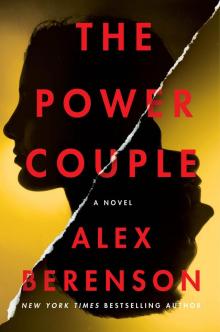 The Power Couple
The Power Couple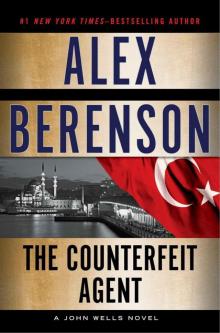 The Counterfeit Agent
The Counterfeit Agent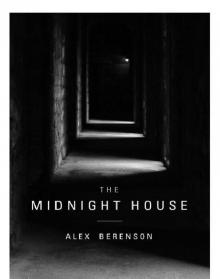 The Midnight House
The Midnight House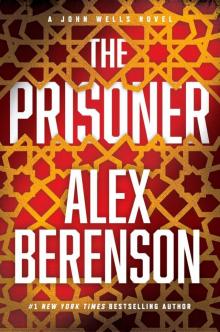 The Prisoner
The Prisoner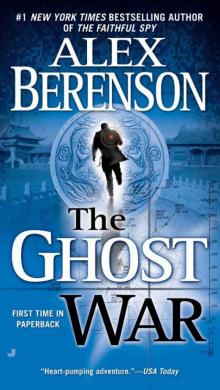 The Ghost War
The Ghost War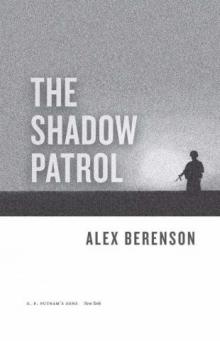 The Shadow Patrol jw-6
The Shadow Patrol jw-6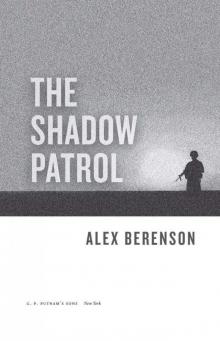 The Shadow Patrol
The Shadow Patrol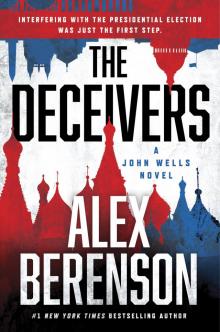 The Deceivers
The Deceivers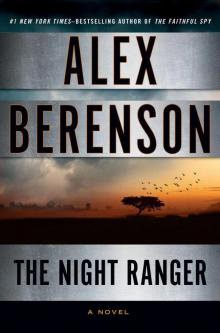 The Night Ranger jw-7
The Night Ranger jw-7 The Faithful Spy
The Faithful Spy The Prince of Beers (Kindle Single)
The Prince of Beers (Kindle Single)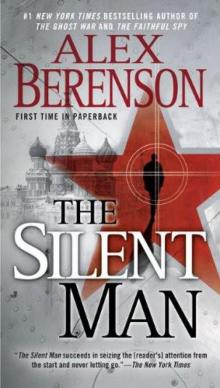 The Silent Man jw-3
The Silent Man jw-3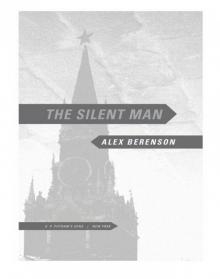 The Silent Man
The Silent Man The Wolves
The Wolves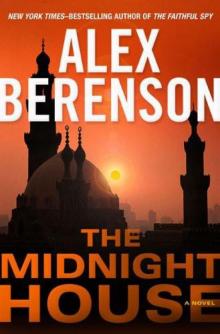 The Midnight House jw-4
The Midnight House jw-4 The Ghost Agent
The Ghost Agent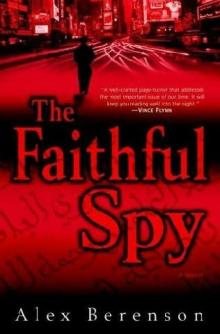 The Faithful Spy jw-1
The Faithful Spy jw-1 The Prince of Beers
The Prince of Beers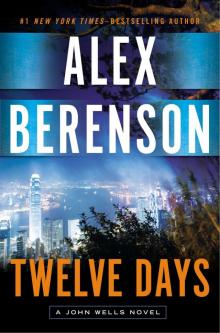 Twelve Days
Twelve Days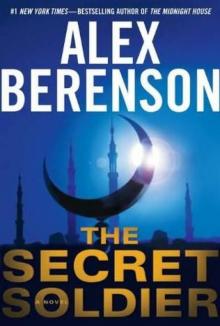 The Secret Soldier jw-5
The Secret Soldier jw-5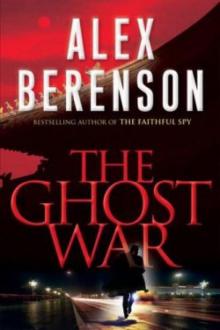 The Ghost War jw-2
The Ghost War jw-2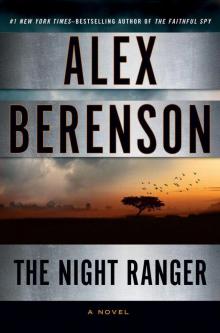 The Night Ranger
The Night Ranger